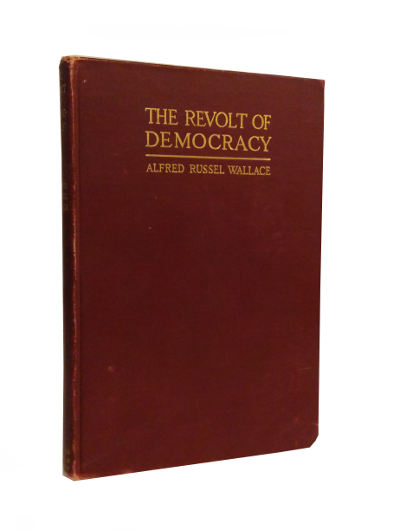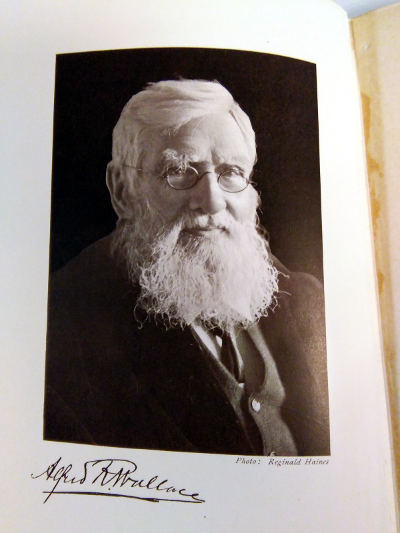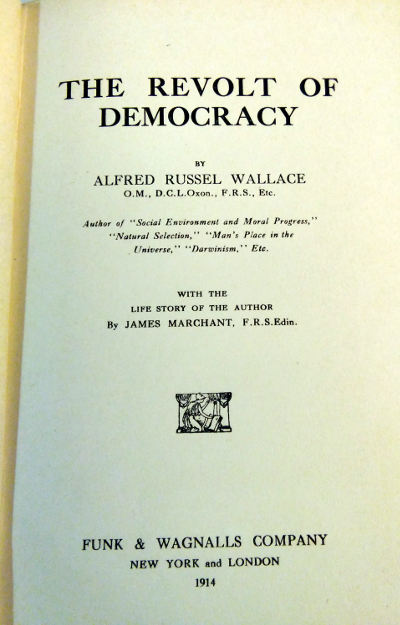A book that encapsulates Wallace’s socialist views, first published just before his death. The book is sort of a manifesto that states it is the government’s duty to make sure that poverty is alleviated, and that wages are raised. Along with a critique of the form of capitalism of Wallace’s day, he suggests remedies – mostly to do with wages and unemployment – to address poverty, industrial exploitation, and income inequality.
About Wallace (from Wikipedia):
Alfred Russel Wallace OM FRS (8 January 1823 – 7 November 1913) was an English naturalist, explorer, geographer, anthropologist, and biologist. He is best known for independently conceiving the theory of evolution through natural selection; his paper on the subject was jointly published with some of Charles Darwin’s writings in 1858. This prompted Darwin to publish his own ideas in On the Origin of Species. Wallace did extensive fieldwork, first in the Amazon River basin and then in the Malay Archipelago, where he identified the faunal divide now termed the Wallace Line, which separates the Indonesian archipelago into two distinct parts: a western portion in which the animals are largely of Asian origin, and an eastern portion where the fauna reflect Australasia.
Wallace was strongly attracted to unconventional ideas (such as evolution). His advocacy of spiritualism and his belief in a non-material origin for the higher mental faculties of humans strained his relationship with some members of the scientific establishment.
Aside from scientific work, he was a social activist who was critical of what he considered to be an unjust social and economic system (capitalism) in 19th-century Britain. His interest in natural history resulted in his being one of the first prominent scientists to raise concerns over the environmental impact of human activity. He was also a prolific author who wrote on both scientific and social issues; his account of his adventures and observations during his explorations in Singapore, Indonesia and Malaysia, The Malay Archipelago, was both popular and highly regarded. Since its publication in 1869 it has never been out of print.
John Stuart Mill was impressed by remarks criticising English society that Wallace had included in The Malay Archipelago. Mill asked him to join the general committee of his Land Tenure Reform Association, but the association dissolved after Mill’s death in 1873. Wallace had written only a handful of articles on political and social issues between 1873 and 1879 when, at the age of 56, he entered the debates over trade policy and land reform in earnest. He believed that rural land should be owned by the state and leased to people who would make whatever use of it that would benefit the largest number of people, thus breaking the often-abused power of wealthy landowners in British society.
In 1881, Wallace was elected as the first president of the newly formed Land Nationalisation Society. In the next year, he published a book, Land Nationalisation; Its Necessity and Its Aims, on the subject. He criticised the UK’s free trade policies for the negative impact they had on working-class people. In 1889, Wallace read Looking Backward by Edward Bellamy and declared himself a socialist, despite his earlier foray as a speculative investor. After reading Progress and Poverty, the best selling book by the progressive land reformist Henry George, Wallace described it as “Undoubtedly the most remarkable and important book of the present century.”
Wallace opposed eugenics, an idea supported by other prominent 19th-century evolutionary thinkers, on the grounds that contemporary society was too corrupt and unjust to allow any reasonable determination of who was fit or unfit. In the 1890 article “Human Selection” he wrote, “Those who succeed in the race for wealth are by no means the best or the most intelligent …”. In 1898, Wallace wrote a paper advocating a pure paper money system, not backed by silver or gold, which impressed the economist Irving Fisher so much that he dedicated his 1920 book Stabilizing the Dollar to Wallace.
Wallace wrote on other social and political topics including his support for women’s suffrage, and repeatedly on the dangers and wastefulness of militarism. In an essay published in 1899 Wallace called for popular opinion to be rallied against warfare by showing people: “…that all modern wars are dynastic; that they are caused by the ambition, the interests, the jealousies, and the insatiable greed of power of their rulers, or of the great mercantile and financial classes which have power and influence over their rulers; and that the results of war are never good for the people, who yet bear all its burthens”. In a letter published by the Daily Mail in 1909, with aviation in its infancy, he advocated an international treaty to ban the military use of aircraft, arguing against the idea “…that this new horror is “inevitable,” and that all we can do is to be sure and be in the front rank of the aerial assassins—for surely no other term can so fitly describe the dropping of, say, ten thousand bombs at midnight into an enemy’s capital from an invisible flight of airships.”
In 1898, Wallace published a book entitled The Wonderful Century: Its Successes and Its Failures about developments in the 19th century. The first part of the book covered the major scientific and technical advances of the century; the second part covered what Wallace considered to be its social failures including: the destruction and waste of wars and arms races, the rise of the urban poor and the dangerous conditions in which they lived and worked, a harsh criminal justice system that failed to reform criminals, abuses in a mental health system based on privately owned sanatoriums, the environmental damage caused by capitalism, and the evils of European colonialism. Wallace continued his social activism for the rest of his life, publishing the book The Revolt of Democracy just weeks before his death.




